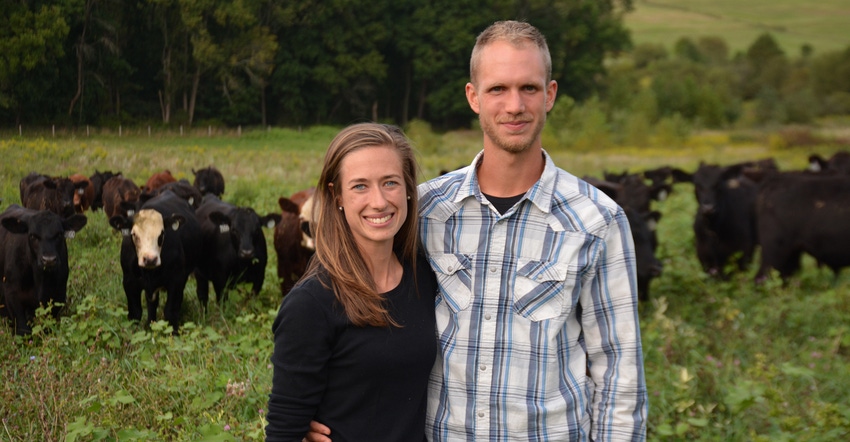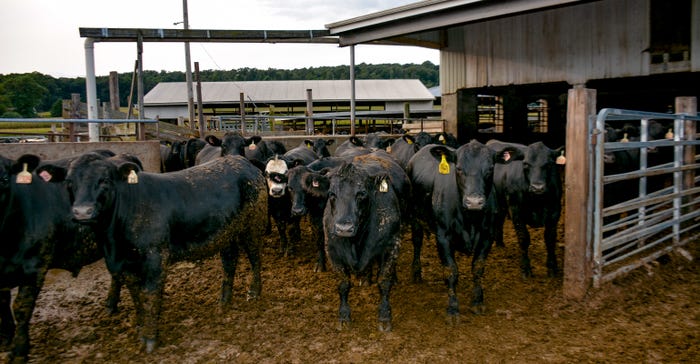
Opening a business is never an easy task. Add in a global pandemic and you would think that it would be nearly impossible for anyone to open a successful business these days.
Unless you raise beef.
For Joy Beam and Gareth Yoder, a young farming couple from Chester County, Pa., the launching of their retail beef business Cedar Meadow Meats started with a dream of developing a Fitbit for beef cattle, then quickly changing to selling locally raised beef.
“It all started as I was helping Joy out in the fields last summer,” Gareth says. “And one of the ideas that I had was, ‘Is there a way that we can detect if a steer is healthy or not based on their activity.”’
Having earned a degree in information sciences and technology, he quickly developed a system where he attached a smartphone on a steer and, using an app-based accelerometer and gyroscope, collected data points from the animal.
After feeding that data into an algorithm and matching the time stamp of the data to actual pictures of the steer, he was able to capture, with 85% accuracy, the cow’s movements remotely.
“We could successfully determine if they were walking, if they were standing still or if they were grazing based on their movements from a smartphone,” he says.
Joy, who was raised on a farm, liked the idea of a Fitbit for beef and saw a lot of potential market opportunities. But they had to find a cheaper way of developing the technology to sell to farmers and ranchers.
Through the Penn State Berks Idea TestLab, they got grants to further pursue the technology and even went to Texas to the Cattle Industry Convention and NCBA Trade Show last winter to see how much interest there was for it.
The good news was there was a lot of interest. The bad news: Larger companies were way ahead of them, and they couldn’t make it cheaper.
A quick change
Undeterred, and already in Texas, the couple visited 44 Farms in Cameron and liked the operation’s focus on direct-to-retail beef. Then they got an idea: If 44 Farms could sell directly to grocery stores, albeit on a much larger scale, why couldn’t they sell their beef directly to the public?
“It was really cool because the speakers in the one session, they really emphasized the need to promote local beef and the fact that consumers nowadays want to know where their food comes from,” Gareth says.
Joy, who is partners with her father, Nelson, in the family’s beef backgrounding and feedlot business, says she’s always had the idea of selling beef locally but didn’t think there was a market for it since she doesn’t raise 100% grass-fed or organic product.
Once they returned from Texas, Gareth got to work on a website, developing one in just three weeks. People could choose a portion of the animal they wanted on the website and then pay for it. The couple even put a sign out on the farm lane making it known that they were selling locally raised beef.
Then, COVID-19 hit.
A hidden opportunity
As the virus spread through Pennsylvania, particularly southeast Pennsylvania, it forced JBS Souderton, the largest meatpacker on the East Coast, to close for two weeks.
Joy says the closing of the plant was devastating. She estimates losing $500 a head over those two weeks since she and her father had to hold the animals, and there was no other place to take them to be processed.
At the same time, grocery stores were struggling to keep with demand for beef and dairy products, and people feared getting sick at the grocery store.
They sold a quarter of their first animal and friends baled them out to buy the rest. Then, things started heating up.
“Even though there is a lot of people selling retail beef, there is way more demand out there. People just want beef,” Joy says.
 DEMAND FOR BEEF: The COVID-19 pandemic has accelerated the demand for locally produced food, including locally raised beef.
DEMAND FOR BEEF: The COVID-19 pandemic has accelerated the demand for locally produced food, including locally raised beef.

They had to scramble to get spots at local butchers, and they made a big push on social media. It worked.
“If a consumer wants quality beef, one of the few ways to get it is from a farmer. That’s the same whether you’re organic, grass fed or conventional like we are,” she says.
From a farm management standpoint nothing changed, except for selecting animals that would normally go to the slaughterhouse and picking them out for retail.
Originally, they had a goal of selling cuts from just three animals. So far, they’ve sold cuts from nine steers.
“We already have spots taken for December and May of 2021, so the demand is out there,” he says.
It’s gone so well that they’re already looking into expanding into hogs and doing retail cuts of pork from Joy’s farrow-to-finish operation.
They plan to add a pork page to their website.
Planning for the long term
The couple has already written a business plan identifying the strengths and weakness of their business, opportunities they can capitalize on and future threats to the business.
They must formally establish their business, though, either through establishing an LLC or something else.
Development is a big issue in Chester County. Farmland is being bought out and land prices are high. Joy says the steers graze on rented land through year-to-year leases. But it’s a struggle because quality lots are hard to find and spending a lot of money to bring a pasture back might not be worth it if a landowner wants to eventually sell it.
The couple also face some tough competition from other local farmers.
“It’s about, how do we keep promoting the brand, how do we keep promoting our story in that we are local and the benefits of buying local," he says.
So far, so good, though. And by adding pork next year, the couple think they can stand out. Gareth thinks that other young farmers should think the same way.
“I say, give it a try. If you don't have high startup costs, give it a try and see where it goes. You never know what tomorrow is going to bring,” he says.
“Don't dream too small,” Joy says.
About the Author(s)
You May Also Like






